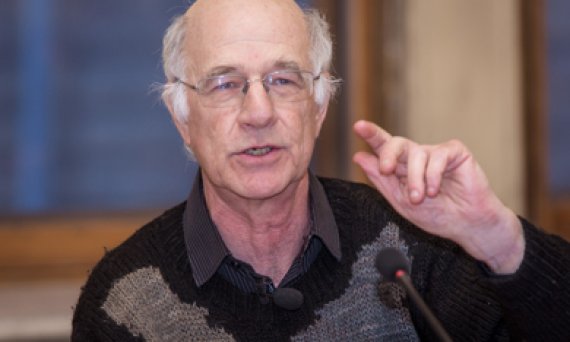On March 26th, Michael Burawoy visited EUSP. He is a professor of sociology at UC Berkeley and served as president of the International Sociological Association (2010-2014). His lecture was held with support from UBS Professorship.
The meeting began with a round table discussion, at which Professor Burawoy and colleagues from the Laboratory of Public Sociology Ilia Matveev and Svetlana Erpyleva discussed issues and outlooks for public sociology in Russia. The sociologists presented the story of the lab foundation, spoke about what, in their opinion, should constitute public sociology in Russia, and shared their experience in producing public sociology research. What is the specific context in which public sociology tries to make visible its activities? In Russia, there are three basic issues public sociology faces. First, the public sphere in Russia is extremely weak and civil society is fragmented. Second, people don’t trust the media. And third, the government is suspicious of this type of activity.
Michael Burawoy concluded that there are certain differences between public and professional sociology — these two schools are, in many instances, antithetical. Public sociology, for example is often accused of populism, whereas professional sociology is accused of objectivism. There are other differences as well. If professional sociology should answer to the demands of scientific community, then public sociology is accountable to society. These schools are simultaneously interdependent and antagonistic. Burawoy sees two strategies for public sociology in Russia: 1) involvement in social rather than political discourse and 2) the transition to a professional science.
Next, he presented his report titled “Marxism After Polanyi.”
How can Polanyi’s ideas help to develop Marx’s ideas? What will the Marxism of tomorrow look like?
The economic historian Karl Polanyi’s classic book “The Great Transformation [Velikaia transformatsiia]” is important for understanding the development of Marxist ideas and adapting them for an analysis of contemporary societies.
The context of society today is neoliberalism and state-sponsored market expansion (marketization). According to Marx, the market is an intermediary for controlled exchange, a regulator of competition, and the domain of commodity fetishism, which hides the connection between products and their production.
Burawoy identified three waves of market expansion: the first began with the recession of 1795 and the enactment of the English Poor Laws. It bottomed out in 1914. The second wave started with the onset of World War I and lasted until 1974. Its peak came in 1933 with the repeal of the gold standard. After 1933 market expansion again began to decline and reached its bottom in 1973 during the oil crisis. The third wave began afterwards and is still growing, perhaps reaching its peak in 1989 with the disappearance of an alternative to capitalism.
In Polanyi’s conception, important fictive goods include labor, knowledge, nature, land, and money. Real goods are objects produced by people for sale on the market, while fictive goods (in Marx’s view) are not. Labor, land, knowledge, and money should not be subject to commodification. According to Burawoy’s models, each uptick in market expansion is connected with the commodification of these or any other fictive goods. For example, the second wave of marketization was marked by the commodification of money. In the 21st century, market expansion has been coupled with the commodification of knowledge.
The 21st century has also seen changes in the roots of social movements. Such movements are often reactions to marketization, and now they struggle for the opportunity to be commodified. In Polanyi’s time a different relationship existed, and social movements fought against their own commodification.
Sofya Lopatina

















